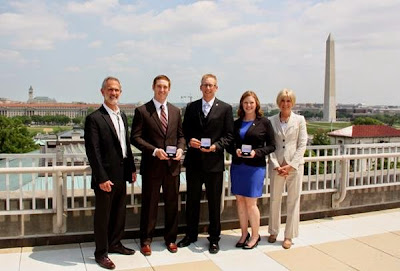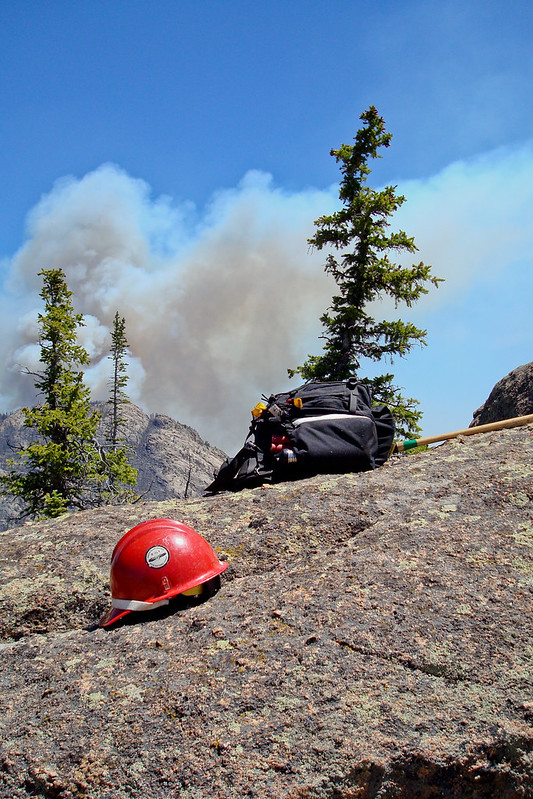 |
| (Left to right: Kip Gray, Dan Olsen, Alex Robertson, Kevin Donham, Brian Scholz, Eric Hipke, Shane Olpin) |
The NWCG Leadership Subcommittee is honored to announce the final recipients for the 2014 Paul Gleason Lead by Example Award. Dan Olsen, Deputy Director, Fire and Aviation for the US Forest Service presented the awards during the 2015 South Canyon Staff Ride. Our congratulations on a job well-done goes to the South Canyon Subject Matter Experts:
Kevin Donham
Kip Gray
Eric Hipke
Alex Robertson
Bryan Scholz
We share with you Dan Mallia's, Redding IHC Superintendent and Paul Cerda's, Alpine IHC Superintendent, powerful nomination. The words of the field are by far better than what we could have written.
**************************************************
Describe the significance of the accomplishment made by the individual or group in the stated category.
For 12 years, the Redding IHC Leadership Development Program has traveled to the location of the South Canyon fire to conduct the Staff Ride for their crew. Over the years the Redding Hotshots have invited other crews, other federal, state, local, international fire and aviation management employees and Washington Office leadership to walk the ground where the Storm King Mountain tragedy took place. In that time, close to 900 people have been lead through the events of the day in conference groups, to glean information and develop slides that they can reference and avoid an outcome similar to South Canyon.
Bryan Scholz, Alex Robertson and Kip Gray, former Prineville Hotshots and Eric Hipke, former North Cascades smokejumper provide a firsthand recount of the events that unfolded on July, 6th 1994. Kevin Donham, fire staff on the Ochoco N.F. at the time of the tragedy relates a valuable and important side of South Canyon story which highlights the importance of programs like
You Will Not Stand Alone and
Taking Care of Our Own.
The South Canyon Staff Ride provides a strong learning experience. The dimension added by Alex, Brian, Kip, Eric and Kevin relating their experiences on the day of the tragedy creates an experience that participants will keep with them. Their presence makes a memorable impact on the participants of the Staff Ride.
The lessons learned by these first-hand accounts are forever branded in the minds and hearts of each staff ride participant. These subject matter experts (SMEs), share their thoughts, emotions and explain in great detail the events from their individual perspectives. These discussions are very raw, the amount of emotion and the openness from each SME is a clear path to connect with every staff ride participant including but not limited students and cadre members. The impact of this staff ride is not limited to agency, GS scale or red card qualifications. The impact and first-hand accounts have helped shape and change the trajectory of the fire service culture as we know it today.
The South Canyon fire and staff ride is recognized internationally as well,
Eric Hipke’s video which was released to the wildland fire community last spring, is one of the most insightful training videos ever produced. The explanation of his perspective, what folks were doing, insight to tactics and strategies can be shared with generations of wildland firefighters now and into the future.
The most appreciated accomplishment contributed by this outstanding group of wildland fire leaders, is their commitment to setting the example of what a “learning organization” should reflect, their dedication to sharing their story with others and most importantly the dedication in honoring their fallen comrades.
Describe how the accomplishment supports the principles and values of the wildland leadership program.
It is important to note that the values listed above were not formally adopted by the wildland fire culture prior to this event. This event marked the beginning of the Wildland Fire Leadership Values and Principles and Leadership Development Program.
The South Canyon Fire is an event that forever changed and shaped the wildland fire service that we have come to know. The SMEs openness and candor in talking about the events on the South Canyon Fire gives the participants a more thorough and in depth understanding of the events of that day. They never waver, falter or dodge questions asked of them, no matter how difficult.
Duty - By telling their story and sharing their lessons learned, the SMEs foster an open and solid learning environment for the staff ride participants. They bring the past with them and encourage learning from it.
All the SMEs have taken it upon themselves to develop current and future fire management leaders by sharing their story. These staff ride participants may not be supervised directly by the SMEs or have any line authority over the firefighters who participate in this staff ride; however, their dedication to hike that hill every year sometimes twice a year to share their firsthand knowledge in chronological order of the events as they remember them is moving and a reflection of these fire professionals developing the community’s young leaders.
Respect - They pay homage every year to their friends and fellow firefighters who died in the line of duty. Sharing their experiences and respectfully passing on the significant history of the event, making certain that we never forget the sacrifices made on the hill that day. Building the team, their team or sphere of influence are all the folks whom have participated in the South Canyon Staff Ride during the span of 12 years.
Integrity - There are two definitions of integrity: one is being honest and having strong morals; the other is being whole and undivided. The SMEs exhibit moral courage by returning to South Canyon every year, telling their story and relating the terrible details of July 6, 1994. They exhibit integrity because they understand that they are speaking for all of the firefighters from the South Canyon fire. These SMEs set the example in their interactions with participants as well as set the example for others who may have experienced similar events so that the wildland fire community can continue learning from unintended outcomes.
Describe the scope of the accomplishment, considering the available resources.
The scope of accomplishment or impact to the fire service (structure and wildland) can be measured with every “right” decision made on the fire ground by fire service leaders who have taken something away from the South Canyon Fire and its staff ride.
The South Canyon Fire is one of the most impacting fires to the wildland fire community as well as to the communities along the western slope of Colorado. The lessons learned from this event have led to a cultural change within the wildland fire organization. The discussions lead by the SMEs listed above has had both direct and indirect positive impacts to the public, firefighters (inexperienced and experienced).
These life-changing events which took place on Storm King Mountain in early July of 1994 are remembered not by statistics on a website or by a date on a calendar. They are remembered every day wildland firefighters train, engage, disengage or ask their supervisors questions regarding LCES and risk management. It is the ancient tradition of oral history, wildland firefighting history that is passed down from these individuals who lived to tell the story and a way for us to remember the 14 firefighters who are not here today to share their version.

















